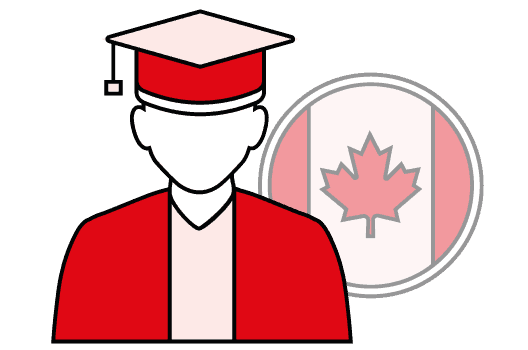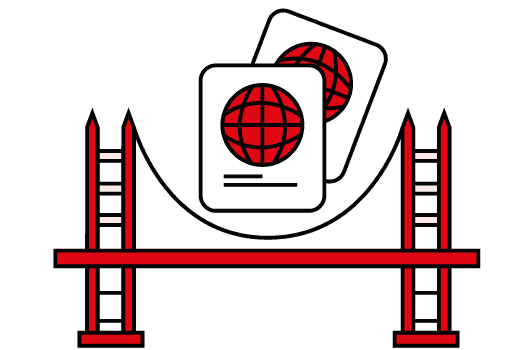Canada is known for its welcoming and inclusive culture, and it provides a range of permanent resident options for those seeking to live and work in the country permanently. Obtaining permanent residency has many benefits, such as access to government-subsidized healthcare, social services, and educational opportunities. It also allows for the eventual application for Canadian citizenship.
A permanent resident of Canada is a foreign national who has received permanent resident status, which allows them to live, work, and study in Canada on a permanent basis. Permanent residents are not Canadian citizens, but they have most of the same rights as citizens, including access to social benefits and protection under Canadian law. Temporary residents, such as students or foreign workers, are not considered permanent residents.
With a variety of programs available, we can help guide you in selecting the right one for your needs. Review some of the most popular scenarios below to determine how to get Permanent Residency in Canada.
Economic immigration to Canada
Express Entry is a program that enables skilled foreign workers, tradespersons, and graduates with English and/or French proficiency to apply for permanent residency in Canada under one of the streams, namely, Canadian Experience Class, Federal Skilled Worker or Federal Skilled Trades.
The application undergoes a Comprehensive Ranking System (CRS) evaluation, which assigns points based on education, work experience, and language proficiency. Candidates with higher CRS scores are selected from the Express Entry pool through regular draws for permanent residency.
The process takes 4-6 months and typically costs between $1,500 to $2,000 CAD.
The Provincial Nominee Programs (PNPs) offer a Canadian immigration option for those who wish to settle in a specific province and can contribute to the provincial economy.
PNP streams may favour individuals with prior connections to the province, such as work experience, study, or family ties, but some streams also accept applicants without such ties.
There are two types of PNP streams: enhanced and base. The former aligns with the Express Entry system, and a nomination certificate results in an additional 600 CRS points, guaranteeing an invitation to apply for immigration to Canada with a target processing time of six months or less.
The latter provides a pathway to permanent residency for individuals not eligible for Express Entry. PNPs involve a two-step process of applying to the province for a certificate, followed by an application to the federal government.
Advantages include the assurance of being wanted at the local level and additional CRS points. The cost and processing time vary by province and stream.
The Atlantic Immigration Pilot Program (AIPP) is intended for those with a job offer in any of the four Atlantic provinces, namely Nova Scotia, New Brunswick, Prince Edward Island, or Newfoundland and Labrador.
AIPP comprises three sub-programs: the Atlantic High-Skilled Program, the Atlantic Intermediate-Skilled Program, and the Atlantic International Graduate Program. One of the main benefits of AIPP is that registered employers do not require a Labour Market Impact Assessment (LMIA) for the job offer to be valid, making the hiring process quicker for employers and applicants.
Employers must partner with a recognized settlement organization to help the applicant and their family settle in.
The cost of AIPP for a single applicant is $1,325, with $825 for the processing fee and $500 for the right of permanent residency fee.
IRCC aims to process AIPP applications within six months. It’s essential to note that applicants must have a job offer from a designated employer in one of the Atlantic provinces and intend to reside in their destination province.
The Entrepreneur Start-up Visa Program is ideal for entrepreneurs who possess the skills and potential to develop innovative businesses in Canada that can generate jobs and compete on a global scale.
Eligible entrepreneurs must obtain the support of a designated organization such as a venture capital fund, angel investor group, or business incubator. They must also satisfy the language requirements and demonstrate proof of settlement funds. It’s essential to note that securing the support of a designated organization doesn’t guarantee government support for the business idea. Successful candidates may qualify for a short-term work permit before applying for permanent residency, which necessitates active and ongoing business management in Canada, essential business operations in Canada, and business incorporation in Canada.
The support of a designated organization is a significant advantage of this program. The program costs $2,075 for the applicant, which includes a federal processing fee of $1,575 and a right of permanent residency fee of $500. Accompanying family members require an additional $225-$1,325, and the IRCC aims to process applications within 12-16 months.
Family Class immigration to Canada
The Family Class Sponsorship program reunites Canadian citizens and permanent residents with their spouses or common-law partners, enabling them to settle permanently in Canada.
The application requires sufficient proof of a legitimate relationship, and if not, IRCC may refuse the application. There are two routes to sponsorship: the Outland route for those outside Canada and the Inland route for those presently in Canada.
During processing, the sponsored person can obtain an open work permit if they are in Canada as a worker, student, or visitor.
The program costs $1,050 CAD, including a sponsorship fee of $75, a principal applicant processing fee of $475, and a right of permanent residency fee of $500.
The government aims to process applications within 12 months, which is generally achieved. It’s crucial to provide enough evidence of a genuine relationship to avoid refusal of the application.
The Parent and Grandparent Program enables non-Canadian parents and grandparents of Canadian citizens and permanent residents to immigrate to Canada.
The program works by periodically opening a window for potential sponsors to submit an online Interest to Sponsor form. After the submission period, some of these sponsors may be invited to submit a full application to sponsor their foreign parent(s) or grandparent(s) for immigration.
Once sponsored, the parents and grandparents will have the same privileges as Canadian permanent residents, such as working anywhere in Canada, access to public healthcare, and more. The cost of sponsorship is $1,050 per person, including a sponsorship fee of $75, a principal applicant processing fee of $475, and a right of permanent residence fee of $500. The processing time for applications is typically 20 to 24 months.
The Child Sponsorship Program is intended for foreign children of Canadian citizens and permanent residents who are under the age of 22, including adopted children.
IRCC accepts applications for the program continuously with no fixed intake periods or quotas. The eligibility is determined based on the familial relationship between the sponsor and the sponsored child. The program’s primary benefit is that it allows families to stay together, which is a crucial part of Canada’s immigration policy.
The cost of the program is $1,050, including a sponsorship fee of $75, a principal applicant processing fee of $475, and a right of permanent residence fee of $500. The processing time varies depending on the applicant’s location.
Quebec
Quebec immigration programs offer an opportunity for foreign nationals seeking to establish residency in Quebec, Canada.
The process begins by submitting an application to the Quebec government for a Quebec Selection Certificate (CSQ), which is a requirement for applying for permanent residency with the federal government.
The immigration programs in Quebec are specifically tailored to meet the demands of the Quebec labour market. The cost of applying for Quebec immigration programs varies and may include fees for the CSQ application, medical exams, and other evaluations or tests.
The processing time for Quebec immigration programs varies based on factors such as the specific program, the volume of applications received, and the demand for workers in the Quebec labour market. Additionally, applicants must have the necessary qualifications and demonstrate their ability to adapt to Quebec society, as well as their intention to reside in Quebec permanently. Proficiency in the French language may also be required for some programs.
Refugee and humanitarian
Refugees and individuals requiring protection from well-founded fears of persecution, torture or death in their home country may receive assistance to settle and integrate into Canadian society, such as language classes and employment support.
Refugee and humanitarian resettlement programs offer a pathway to permanent residency in Canada for people who need protection, and they may be sponsored by the government or private sponsors. Canada’s commitment to providing refuge and protection to those in need provides a safe and secure environment for people who are unable to return to their home country due to safety concerns.
The government sponsors the refugees at no cost to them, while private sponsors are responsible for covering the resettlement expenses, including living expenses for the first year. Processing times for refugee and humanitarian resettlement programs vary based on individual circumstances.
Permanent resident F and Qs
A Permanent Resident Card (PR card) is a document that shows that a person is a permanent resident of Canada.
A PR card is valid for five years.
Yes, a permanent resident can travel outside of Canada, but they must ensure that their PR card is valid and they must present it along with their passport when returning to Canada.
To maintain permanent resident status, a person must have been physically present in Canada for at least 730 days (2 years) in the last five years.
Yes, after meeting certain eligibility criteria, a permanent resident can apply for Canadian citizenship.
No, only Canadian citizens are allowed to vote in federal, provincial, or municipal elections.
Yes, a permanent resident can lose their status if they do not meet the residency requirement, or if they are convicted of a serious crime or if they become a Canadian citizen.
Yes, a permanent resident can sponsor certain family members for permanent residency, such as a spouse or dependent children.
Nicola Wightman
Nicola Wightman is a regulated Canadian Immigration Consultant (RCIC) under the College of Immigration and Citizenship Consultants (CICC). Her professional immigration consultant number is R706497.
Immigration options
Book a Consultation
Are you ready to achieve your Canadian immigration goals?
Book a consultation today to discuss your needs and explore the best options available to you.


